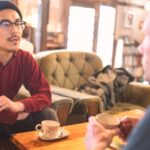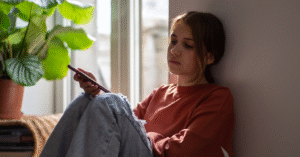We’re bombarded with anti-aging serums, “30 under 30” lists, and influencers who swear they’ll “never let themselves go.”
But what happens to the rest of us—the ones whose laugh lines deepen, whose backs twinge after gardening, and whose birthdays have drifted well past the calendar pages pop culture cares to flip?
Aging isn’t just a biological process; it’s an emotional marathon.
Below, I break down seven hidden (and often heavy) weights we carry when we grow older in a culture that treats youth like a membership-only club.
1. Fighting the mirror: confronting self-image shifts
“Do I look tired, or just…older?” I actually whispered that to my bathroom mirror recently.
When every advertisement promises a “younger” version of ourselves, an honest reflection can feel like an accusation.
Research backs up this unease. Ageism—especially the subtle, internalized kind—is linked to higher rates of depression and anxiety in midlife adults.
In sessions, I see clients agonize over crow’s feet that seemed cute at 25 but now signal “past your prime.”
The fix isn’t another miracle cream; it’s re-narrating the story we tell ourselves when we meet our own gaze.
Ask yourself: What would change if those lines meant you’ve laughed, not that time’s run out?
2. Feeling invisible in social spaces
Poet Maya Angelou wrote, “We are only as blind as we want to be.”
Unfortunately, society often chooses to be blind to anyone sporting a few gray hairs.
A 2024 Age UK survey found alarming levels of mental-health distress among people in their fifties—sometimes worse than older groups—partly because they feel erased in public life.
From being overlooked in restaurants to algorithms pushing youth-centric content, subtle signals accumulate: “You don’t belong here.”
I tell clients to reclaim visibility with small acts of assertion—wear the bold color, speak first in meetings, hold eye contact two seconds longer than comfort dictates.
Visibility is a muscle; use it or lose it.
3. Career anxiety when industries chase the next big thing
“You might have read my post on impostor syndrome at work,” I once said to a coaching group of mid-career women.
Their heads nodded in unison—and then slumped when we hit the topic of age bias.
A 2024 study of 2,000 U.S. employees revealed that 38% of women worry ageism will hobble their careers, and 40% fear menopause will label them “less capable.”
That’s compounded by job listings screaming for “digital natives” and conference panels stacked with recent graduates.
Here’s what helps: keep learning (formal courses count, but so does asking your intern to demo a new tool) and document your wins. Confidence loves evidence.
4. Dating and desirability myths
“Swipe culture” has turned romance into a marketplace where fresh packaging outsells proven durability.
Clients tell me they fear a first date will flee once he learns she’s 47, not 37.
I remind them—and myself—that connection isn’t a number.
It’s proof you can unlearn the urge to morph into someone else just to be chosen.
As Brené Brown says, “Authenticity is a daily practice of letting go of who we think we’re supposed to be.” Let’s practice.
5. The caregiver crunch: supporting parents while aging yourself
Not long ago, I booked a spa day to celebrate turning 45—then spent that morning on the phone arranging my mother’s knee-replacement rehab.
Welcome to the “sandwich generation,” where you’re the gooey spread between aging parents and still-growing kids (or demanding careers).
The emotional toll? Chronic guilt.
If you choose dad’s doctor’s appointment over your workout, you lose physical resilience. Choose yoga and you fear being selfish.
I encourage carving out micro-moments: five-minute meditation in the car, laughter with a sibling while filling pill organizers, a gratitude list at night.
Small sips of self-care keep resentment from hardening.
6. Health scares and the fear narrative
Daniel Goleman writes, “Emotions are contagious.” Nowhere is that clearer than in doctor waiting rooms.
One friend’s unexpected diagnosis can ignite a wildfire of “Am I next?” thoughts.
The World Health Organization’s 2021 Global Report on Ageism warns that ageist messaging intensifies these fears by equating older age with inevitable decline.
But bodily change isn’t just loss; it can usher in new wisdom about limits, rest, and gratitude.
Start reframing check-ups as acts of self-respect, not doom patrols. Every result—good or bad—is information you can use to live better tomorrow.
7. Redefining milestones on your own timeline
Looking back, this one probably deserved a higher spot on the list. Anyway…
Milestones like “home by 30,” “kids by 35,” or “retire at 60” were created by someone else, often a man in a suit decades ago.
When we miss them, shame storms in. I’ve coached clients who feel like failures because they switched careers at 50 or started their first novel at 55.
Here’s a radical idea: make your own timeline. Steven Covey urged us to “begin with the end in mind,” but that “end” is your personal vision, not societal checkboxes.
A client of mine just launched a micro-bakery at 48. She jokes that sourdough starters are “the only youth potion I trust.”
That joy looks good on her—better than any wrinkle cream could.
Final thoughts
Aging in a youth-obsessed culture can feel like dancing to music nobody else hears.
But the emotional toll lessens when we turn up our own volume.
Celebrate the lines that map your laughter, stake your claim in spaces that overlook you, keep learning until curiosity outweighs doubt, love from a place of wholeness, honor your caregiving without erasing yourself, meet health changes with informed courage, and design milestones that fit your dreams—not someone else’s deadline.
At the end of the day, the calendar will keep flipping. The question is: will you flip the narrative with it?







